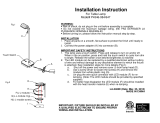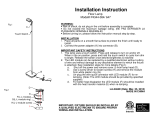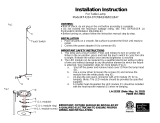
Table of Contents
v
[en] | 02/2020 | 5100052099 | LTW20Z-1 | Operator’s Manual
7.6 Alarms and Shutdown Conditions........................................................................................................ 44
7.7 Resetting the Maintenance Timers ...................................................................................................... 45
7.8 Raising the Tower (Manual Winch System)......................................................................................... 46
7.9 Lowering the Tower (Manual Winch System) ...................................................................................... 49
7.10 Raising the Tower (Power Winch System) .......................................................................................... 51
7.11 Lowering the Tower (Power Winch System)........................................................................................ 53
7.12 Starting the Machine............................................................................................................................ 54
7.13 Stopping the Machine .......................................................................................................................... 55
7.14 Auto Mode (Remote Run).................................................................................................................... 56
7.15 Generator Derating .............................................................................................................................. 56
7.16 Receptacle Panel................................................................................................................................. 56
7.17 Emergency Stop Switch....................................................................................................................... 58
7.18 Wet Stacking........................................................................................................................................ 59
8 Maintenance
8.1 Maintenance Table .............................................................................................................................. 60
8.2 Periodic Maintenance Schedule .......................................................................................................... 60
8.3 Installing/Removing Light Fixtures....................................................................................................... 61
8.4 Replacing/Removing Lamps................................................................................................................ 62
8.5 Daily Inspection ................................................................................................................................... 64
8.6 Checking Engine Coolant .................................................................................................................... 64
8.7 Servicing the Air Cleaner ..................................................................................................................... 65
8.8 Changing the Engine Oil...................................................................................................................... 66
8.9 Maintaining the Fuel/Water Separator ................................................................................................. 67
8.10 Maintaining the Trailer ......................................................................................................................... 68
8.11 Maintenance Tier 4 Final Engines: Isuzu............................................................................................. 68
8.12 Coolant ................................................................................................................................................ 73
9 Malfunctions
9.1 Troubleshooting ................................................................................................................................... 74
10 Storage
10.1 Long-Term Storage.............................................................................................................................. 76
11 Accessories
11.1 Factory-Installed Options..................................................................................................................... 78
11.2 LED Lights ........................................................................................................................................... 78
12 Technical Data
12.1 Engine—T4f......................................................................................................................................... 79
12.2 Generator............................................................................................................................................. 80
12.3 Machine—Tier 4f.................................................................................................................................. 81
12.4 Metal Halide Radiation Compliance..................................................................................................... 81
12.5 Dimensions .......................................................................................................................................... 82























